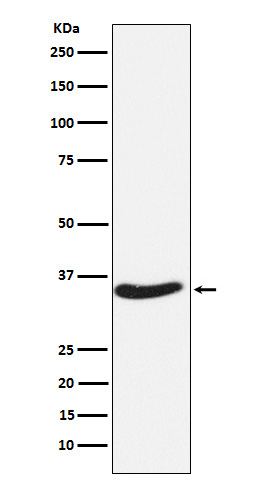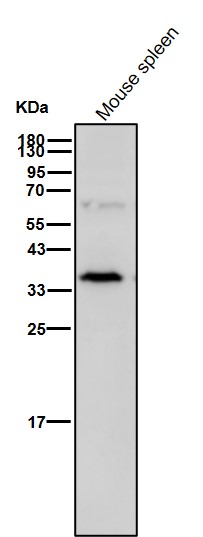

| WB | 咨询技术 | Human,Mouse,Rat |
| IF | 咨询技术 | Human,Mouse,Rat |
| IHC | 咨询技术 | Human,Mouse,Rat |
| ICC | 1/50-1/200 | Human,Mouse,Rat |
| FCM | 咨询技术 | Human,Mouse,Rat |
| Elisa | 咨询技术 | Human,Mouse,Rat |
| Aliases | EAP1; Exosc7; p8; RRP42; Rrp42p;;EXOSC7 |
| WB Predicted band size | 32 kDa |
| Host/Isotype | Rabbit IgG |
| Antibody Type | Primary antibody |
| Storage | Store at 4°C short term. Aliquot and store at -20°C long term. Avoid freeze/thaw cycles. |
| Species Reactivity | Human |
| Immunogen | A synthesized peptide derived from human EXOSC7 |
| Formulation | Purified antibody in PBS with 0.05% sodium azide,0.05% BSA and 50% glycerol. |
+ +
以下是3篇涉及EXOSC7抗体的参考文献及其摘要概括:
---
1. **文献名称**:*EXOSC7 mutations impair mRNA export and cause autosomal dominant cerebellar ataxia*
**作者**:Boczonadi V, et al. (2021)
**摘要**:该研究利用EXOSC7特异性抗体进行免疫印迹和免疫荧光实验,发现EXOSC7突变导致患者成纤维细胞中外泌体复合体稳定性降低,影响mRNA核质转运,从而引发小脑性共济失调。
---
2. **文献名称**:*The RNA exosome complex regulates stability of the hepatitis B virus encapsidation signal*
**作者**:Hsu CY, et al. (2016)
**摘要**:通过EXOSC7抗体进行免疫共沉淀(Co-IP)和RNA干扰实验,证明外泌体复合体通过EXOSC7亚基靶向降解乙型肝炎病毒(HBV)的εRNA元件,抑制病毒衣壳化信号稳定性。
---
3. **文献名称**:*Exosome subunit Exosc7 is essential for neurodevelopment through modulating RNA processing in neural stem cells*
**作者**:Zhang L, et al. (2020)
**摘要**:利用EXOSC7抗体在小鼠模型中研究其表达模式,发现Exosc7缺失导致神经干细胞中rRNA加工异常和凋亡,揭示了其在神经发育中的关键作用。
---
以上文献均通过EXOSC7抗体验证蛋白表达或功能,涉及疾病机制、病毒调控及发育生物学领域。若需更详细信息,建议通过PubMed或期刊官网查询全文。
The EXOSC7 antibody is a crucial tool for studying the EXOSome component 7 (EXOSC7), a protein integral to the human exosome complex. This evolutionarily conserved, multi-subunit complex plays a central role in RNA processing, surveillance, and degradation. Specifically, the exosome regulates the 3'-end trimming of various RNA substrates, including ribosomal RNA (rRNA), small nuclear RNA (snRNA), and messenger RNA (mRNA), while also degrading aberrant transcripts to maintain cellular homeostasis. EXOSC7 (also known as RRP42) is a structural component of the exosome's core ring-shaped structure, contributing to its stability and enzymatic activity.
Antibodies targeting EXOSC7 enable researchers to investigate its expression, localization, and interactions within the exosome. They are widely used in techniques like Western blotting, immunofluorescence, immunoprecipitation, and chromatin immunoprecipitation (ChIP). Such studies have linked EXOSC7 dysfunction to diseases, including pontocerebellar hypoplasia (a neurodevelopmental disorder) and cancers, where altered RNA metabolism drives pathogenesis.
Validated EXOSC7 antibodies exhibit specificity for human, mouse, or rat homologs, often cross-reacting due to high sequence conservation. Researchers rely on these antibodies to explore RNA quality control mechanisms, gene regulation, and disease pathways, making them essential for advancing RNA biology and therapeutic discovery.
×